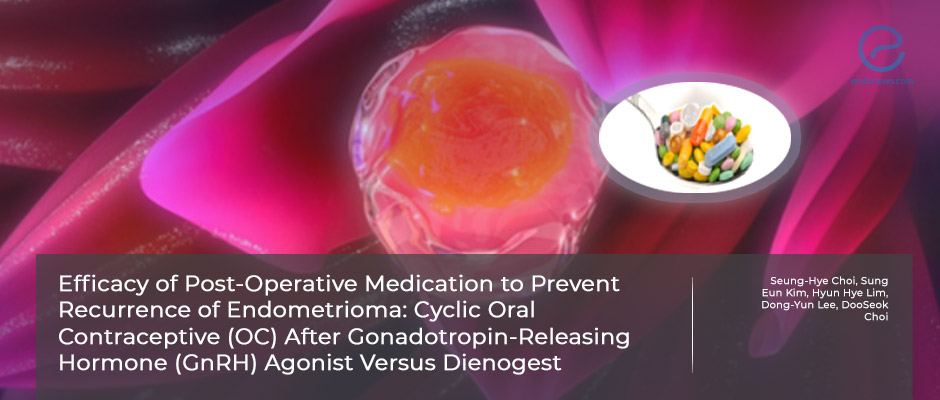The effect of postoperative hormonal medication preferences on the recurrence rate of endometrioma
Sep 9, 2022
Both dienogest and combined oral contraceptives are on the same page when it comes to endometrioma recurrence in the 5-year follow-up
Key Points
Highlights:
- Using "only dienogest" and "adding combined oral contraceptives to injection of GnRH agonist" reveal similar outcomes for endometrioma recurrence after surgical excision of endometrioma.
Importance:
- It is a 5-year follow-up study to evaluate the recurrence rate of endometrioma in patients using dienogest continuously and patients who have got shot(s) of GnRH agonist and continued with combined oral contraceptives.
What's done here:
- To evaluate the effect on preventing the recurrence of endometrioma after laparoscopic surgery, the long-term effects of two medical treatment options were compared.
- Women who had endometrioma surgery at a single center between 2000 and 2020 have been included.
- The group that received "combined oral contraceptives after GnRH agonist (n=372)" was compared to the group receiving only dienogest (n=252).
- Recurrence has been defined as capturing 2cm and above-sized endometrioma on ultrasound and follow-up data up to 60 months was statistically evaluated.
Key Results:
- The recurrence rate of endometrioma for 60 months has been found as 2.08% in combined oral contraceptives after the GnRH agonist group and 0.40% in the dienogest group.
- No statistical difference in cumulative recurrence of endometrioma could have been shown referring to no superiority of one over the other.
Limitations:
- The long-term follow-up nature gives strength to the study.
- Adding two more groups for no medication and combined oral contraceptives only and also defining the symptom recurrence would have increased the significance of the results.
Lay Summary
Endometrioma is the most investigated type of endometriosis. The recurrence after surgery is important regarding its and reoperation’s effect on ovarian functions.
In the study conducted by Seung-Hye Choi et al, the researchers questioned the effect of different postoperative hormonal treatment modalities on endometrioma recurrence. Women who had planned endometrioma surgery at a single center between 2000 and 2020 have been included.
The data of 372 women who had COC after GnRH agonist and 252 patients who used dienogest for at least six months after surgery visited the clinic regularly and had no endometrioma postoperatively have been investigated.
Recurrence has been defined as capturing greater than 2cm in size of endometrioma on an ultrasound scan. Kaplan Meier recurrence curve has been calculated including follow-up data up to 60 months (median 34.36m).
The recurrence rate of endometrioma for 60 months has been found as 2.08% in COC after the GnRH agonist group and 0.40% in the dienogest group.
No statistical difference in cumulative recurrence of endometrioma could have been shown referring to no superiority of one over the other.
While the study gives long-term knowledge about recurrence, the missing "no medication" or "COC-only groups" and also "the lack of symptom recurrence questionnaires" are the limitations of the research.
This study was published in the July issue of the "Korean Journal of Medical Sciences".
Research Source: https://pubmed.ncbi.nlm.nih.gov/35790209/
endometrioma recurrence COC dienogest progesterone GnRH ultrasonography

